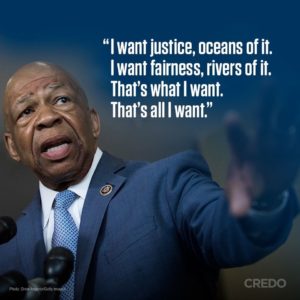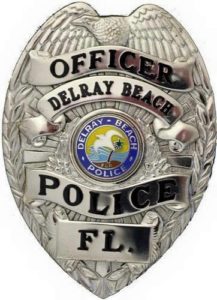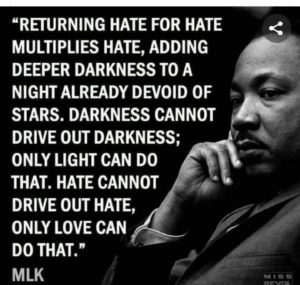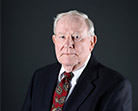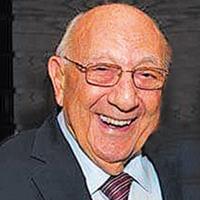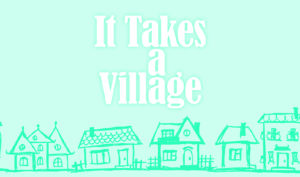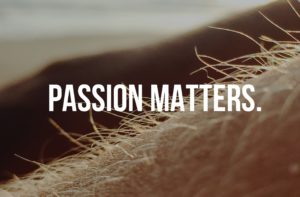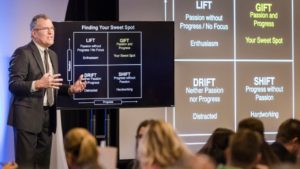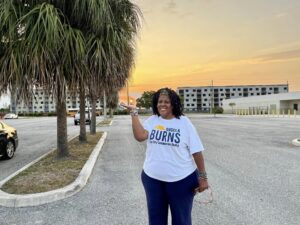
Commissioner-elect Angela Burns.
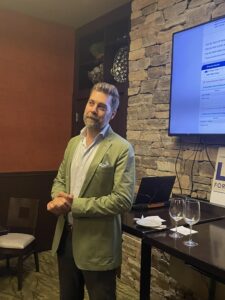
Commissioner-elect Rob Long.
“It’s a new day in Delray Beach and it feels good.”
“When the people unite, love prevails.”
“Excited to see the story of repair, restoration and reconciliation unfold in Delray Beach.”
“A true testament that the ‘power of the people’ is stronger than the ‘people in power’.”
“Praying for leadership that communicates, engages the public and works together with the community and businesses as a team again.”
“Delray has spoken. Let the collaboration and community involvement begin!”
I’m writing this the day after perhaps the most intense election in recent Delray Beach history and I am enjoying letting my eyes take a stroll through Facebook.
The above is just a sampling of the good feeling in town. Over the past several days as I’ve gone about my day, I’ve been running into people who are over the moon excited by last week’s election results. The birds are chirping, a cool breeze is blowing, hope has been restored!
That’s not something I could have said for many years. Delray has been put through the ringer.
Needlessly, I might add.
But today, the sun is shining and there is hope that we can get back to community building, which we once excelled at like no other town. Let me repeat that; like no other town.
It is time to heal.
I spent election night at Harvest restaurant watching the people that worked together to build Delray rejoice. They backed Rob Long and Angela Burns, and their favored candidates won and there were smiles all around. Check that: there were tears too.
The people in that room, police officers, firefighters, teachers, volunteers, retirees, and young professionals want a city that listens to them, involves them, and respects their opinions.
They don’t want to be labeled, they don’t want to fight, they want to make a life here and all of them want to give back.
Why?
Because they love this town.
I got a text this morning from a friend who felt for years that he could not be seen with certain people because it would hurt his business. Today, he feels relieved. He no longer worries about retribution.
But while I was gratified to see my heroes and heroines smile again as the results poured in—I was waiting to see what Commissioner-elect Long would say in his victory speech.
He delivered.
Rob thanked the people in the room. He gave them credit for their hard work and contributions, and he showed respect and humility—that’s what servant leaders do.
Then he said that he wanted to serve all the people in Delray, even those who did not vote for him.
I like that. That was the magic moment.
We need more of that. A lot more.
He called for a return to civility and collaboration. He called for involvement and input.
These are not innovative notions; this is common sense.
Our partisan politics have divided us and threatened the existence of our nation. We don’t need that brand of politics in our hometown.
There is another way.
If I’ve learned anything in my years observing government and business, it is that kindness is essential to leadership.
Along with integrity, intelligence, a willingness to learn and a passion for service, kindness is indispensable.
Being nice does not mean that you are a pushover. But it does mean that when presented with a problem or a difference of opinion, you try and find a solution that doesn’t destroy, divide, or degrade.
But unkind people do just that.
Unfortunately, power attracts bullies. And bullies often get far on their bravado (which usually is a mask for insecurity).
In other words, they can get the job—but they can’t last. And they can’t do the job well either.
Why?
Because they divide, degrade, and destroy, and that becomes their legacy.
We have seen bullies take a sledgehammer to nations, states, and cities.
They seek to vanquish opponents, demand total fealty and end up losing because bullying gets old. People get fed up and move on. But before we make a course correction, a lot of damage happens. And that’s a shame.
The last few years have been exhausting and expensive.
We have lost our cultural arts center (and it’s going to cost us millions to get it back), told a generation of civic leaders that they are useless and took a matchstick to philanthropy.
We have watched precious assets such as our historic golf course go to seed, seen talented civil servants bullied into submission and we have refused to engage citizens—when engagement turned this town around.
It’s not wise when a town turns its back on what made it successful.
As a result, we have become a case study in how to climb a mountain and then give it back.
We have told a generation who gave of themselves that they are good ole boys who made a mess.
We have labeled, threatened, and harassed people who should be respected.
It’s not right. And it’s ruinous.
We kept pulling threads out of our civic fabric. Well, keep pulling and the garment eventually falls apart.
Some things…let’s just say once they break, they can’t be fixed.
We have beat this town and its best citizens to a pulp. But they are not going away.
Last week, many of them fought back. They fought for their community.
And they won.
They worked hard…knocked on doors, called and emailed their neighbors and made a persuasive argument that we need change.
And they were rewarded.
But now the hard work begins. We have to heal some wounds, we have to reach out to all stakeholders, and we have to address serious issues: infrastructure, housing affordability, schools, water quality, sea level rise and how to work together again.
There is also a whole lot of misinformation surrounding development in Delray. We addressed it 20 plus years ago with the Downtown Master Plan, which was an inclusive and educational experience. We went to school together as a community and learned a lot. We need that kind of effort again—but this time it needs to address citywide concerns about traffic, uses and design.
There’s a lot to do.
But the people have spoken.
They voted for collaboration and involvement.
Our leaders need to lead. The people are ready. Time to get to work.
Bite Size election thoughts:
- I’ve never seen such an all hands-on deck effort to elect candidates since the 1990 race that saw Tom Lynch elected mayor and Jay Alperin and Dave Randolph elected to the commission. There was a similar dynamic back in 1989-90 with a strong desire to change direction and change the tone of politics in Delray.
- Old School Square was an animating issue that galvanized voters. According to polling I saw, nearly three quarters of likely voters were against the decision to terminate the lease with OSS and didn’t like how it was done, i.e. without public notice, public input or a plan.
- Friends of Delray is a group to watch. They have produced many fascinating video podcasts available on Youtube, lots of interesting articles etc. This is a volunteer effort done by people who care. I hope you check them out and I hope they stay around.
- The Palm Beach Post and the Sun-Sentinel endorsements didn’t change the race. Sadly, few people are reading newspapers these days. Even sadder, why do newspapers that don’t cover the community endorse at all? It was clear from reading the endorsements that those papers have no clue about what’s going on in Delray. Embarrassing. The Sun-Sentinel’s endorsement was especially tone deaf. Apparently, editorial writers for the Post and Sun-Sentinel don’t read Randy Schultz’s CityWatch blog. https://www.bocamag.com/category/communitycity-watch/city-watch/
Mr. Schultz worked for decades at both papers. During my second bout with Covid, I spent four days archiving three plus years of his columns chronicling the adventures of the City Commission. It was an eye-opening and surreal experience. I stopped at 180 pages worth of controversy, fights, dropped balls etc. and sent them to the campaigns. It’s an endeavor I do not recommend.
- Finally, voter turnout is ridiculously low. It’s not the sign of a healthy community. Our vote is our voice and too many people don’t exercise the right that so many have fought and are still fighting to protect. Countywide only 12.66 percent of registered voters cast a ballot. In that 1990 race referenced earlier, over 40 percent turned out to vote. That was a landmark figure, but if you think about it, even that turnout means that 6 of 10 voters stayed home. In this race, nearly 9 of 10 did. The issues that affect our lives, homes and businesses are decided by a microscopic subset of people.
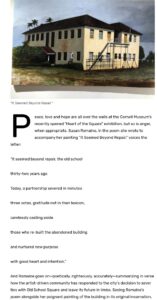
Artist Susan Romaine was an ardent supporter of Old School Square.
Note:
We are saddened by the recent loss of Susan Romaine, a local artist who touched so many hearts through her spirit, kindness and immense talent.
Susan was dedicated to Old School Square and was a touchstone and inspiration for a slew of local artists.
She was represented by galleries in Delray Beach and Santa Fe and was an artist in residence at the Gibbes Museum in Charleston, S.C.
In her own beautiful words:
“Quite frequently as I paint an image, I begin to see multiple levels of symbolism that I hadn’t noticed in that first blush as I passed by. I learn something more about the space or people I have observed and get a far deeper sense of the human presence that occupied time and space with their surroundings. It is this studio-bound journey of discovery, those “ah ha” moments, that keeps that brush of mine moving across the canvas.”
She will be missed. She was a sweet soul.
